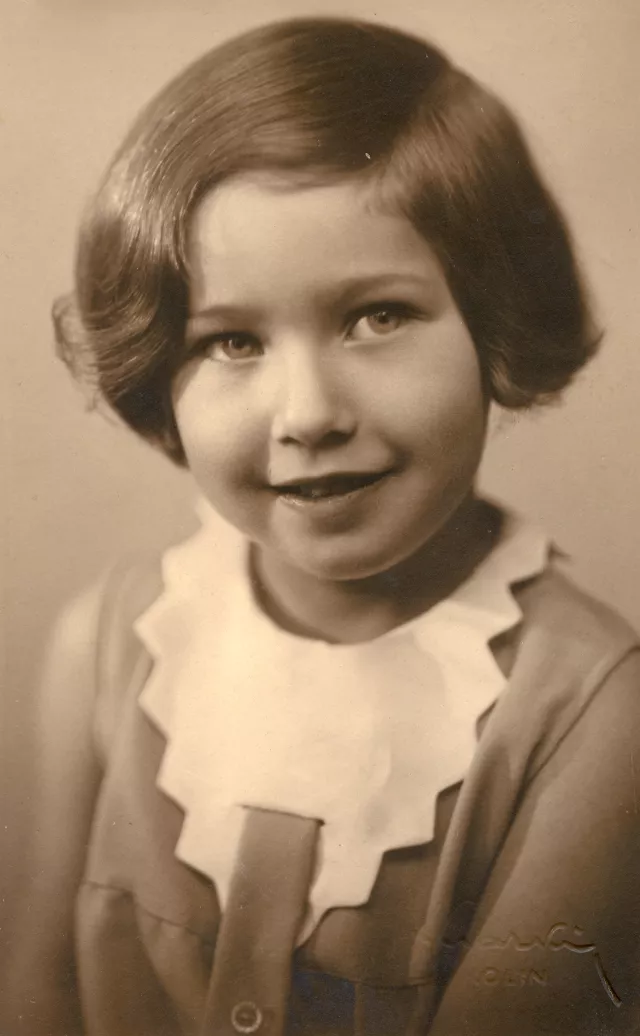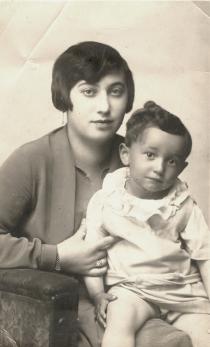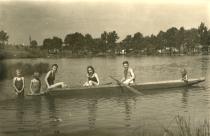Alena Munkova
This is the same photograph as the one where I'm with my brother, except that here they photographed me alone.
My childhood is much interwoven with Letna, where I lived. I really was rooted in that sidewalk there. The way they say a person has roots in land, here it was the sidewalk, with its paving stones. I knew all the store owners on Letna, I used to run to the park there, and to Stromovka Park. And the loss of that place where you grew up - and certainly it's different for everyone - can't be renewed again. A person pretends a bit, but it's gone. After the war I did return to Letna, but everything was different. But to this day, when I walk by Letna, I feel a twinge. To this day, I smell that aroma, what it smelled like there. I remember colors a lot, and smells perhaps even more. I think that childhood forms a person, whether he wants it or not. Or also deforms.
Before I started going to school I was at home, but from what I've been told, my older brother Jiri attended French nursery school that last year before he went to school. But I remember being in Brevnov with my mother, and I even know about where the staircase was that she used to lead me up to dance school. I was five at the time. In one of those dance schools for little children I was even supposedly supposed to play a part in some theater, back then it was the German Theater, which today is the State Opera beside the main train station. But my father forbade it, that he didn't want me to grow up to be in the theater. Despite his being such a liberal, something conservative inside him reared its head. I remember being terribly sad because of that. I guess my mother didn't succeed in forcing the issue, or didn't want to, I don't know.
Then I started Grade One. From this time I remember that an apprentice from my father's lab used to come get me after school. I would always come with untied shoelaces, so he'd always tie them for me. I think that by then my mother was quite ill, and so no one was really taking care of me much. That it's the result of there being no one to tell me: 'You've got to tie them yourself.' That's why I'm talking about it, not because of those shoes.
I don't remember what went on after my mother's death, it's a blank spot for me. All I remember is us moving to another apartment. This is because our father remarried, but that second wife also died of cancer five years later. That must have been something insane for my father, an absolute train wreck. I was 12, so it was most likely in 1937 or 1938. That wife was named Marta, née Polakova, then Erbenova, and Synkova after my father. So she was once divorced. She was also a dentist.
Besides trips to Kluky to visit my second mother's parents, I also used to go to a guesthouse during the summer holidays, which was in Doksy. I was supposed to learn German there, but because it was all Czech children there, besides the German teachers, we spoke only Czech. It was by Mach's Lake, so I've got beautiful memories of Mach's Lake, where at the age of nine, when I was there, I probably learned to swim a bit, but I don't exactly know any more. One summer vacation, I might have been 9, 10 or perhaps 11, we were in a different guesthouse, in Nadejkov, which is in southern Bohemia, whose owners were relatives of my first mother, by the name of Seger. They had a farm in Nadejkov, and during the summer there was some sort of camp set up there, where my brother and I were invited. Mrs. Segerova was probably my mother's cousin.
I have memories from the beginning of the war, and they're still quite sharp, because I wasn't brought up in the spirit of some sort of Jewish consciousness, and so it was something new for me at the time. Besides that, I was in puberty. Suddenly came this blow from nowhere, in the sense that the war was actually the beginning of a feeling, at first not completely conscious, but then of course more and more intensely conscious feeling, that I didn't belong in the society that I lived in. They threw us out of school 11; we weren't allowed to continue. One prohibition followed another, I don't know exactly from what date. My father, who you could say was emotionally unstable, was breaking down more and more. I was suddenly in a situation where I began to be afraid of people.
The first impact was already before the war, when some little girl in Sokol yelled 'Jew' at me. I had no idea what she was going on about. We were an absolutely assimilated family, but it didn't come about through some specific aim, it came about due to our way of life.
It was also back then during the war that my big complex began, because I said to myself that I don't belong among Jews, that I simply don't belong. My puberty played a role in this too. I wanted to be like other people, and it even went as far as me reproaching my father for my first mother also being Jewish, that I would have at least been only half and half. Later I regretted this terribly.
Luckily, during the war my third mother lived with us, Anna Mandova, who married my father just before the prohibition of mixed marriages, so she put herself at great risk. What's more, her relatives tried to talk her out of it, understandably from fear for her future existence. She of course wasn't Jewish, but a Catholic, utterly tolerant.
At that time we lived in fear and tension, and you can say that my father was a nervous type, and that it of course rubbed off on me. I turned to books for some sort consolation, and already back then I was writing these little verses, I was 13, 14 at the time. I read only poetry. I read prose only a bit. I was very influenced by literature, maybe even of a somewhat exclusive type, especially for my age, which my brother, who was five years older, used to give to me. During those times all he was doing was reading, he was as opposed to me very single-minded and was gathering knowledge. For him it was also actually his future profession. He concerned himself with words, and so did I, but in a different way. He was an example for me, but of course we also fought. He used to scare me at night in that children's room, with lights and so on. So sometimes I hated him. But he influenced my reading, and with my affinity for poetry I was then this insufficiently realistic person. My thoughts were influenced by a certain dream factor, the non-acceptance of reality. This conflict was very, very strong in me.
In December 1942, I myself was summoned to the transport. My brother had been summoned earlier, but didn't get on, and went into hiding. My father was protected by his marriage to a non-Jew, so he didn't get a summons at all. That's when I saw my father for the last time, he had completely collapsed, because there was nothing he could do. Even before that he had been living under terrible tension, in terrible fear, and then suddenly... For him I was a little girl, even though I wasn't all that little any more.
In Terezin I wasn't all alone anymore, some sort of society formed there. The people there were in the same situation. When I arrived there, we were in the so-called shloiska [the Hamburg barracks, so-called shloiska, likely from the German die Schleusse: women's accommodations, and from 1943 especially for Dutch prisoners. At the same time the main transport dispatch location - Editor's note], which is a quarantine. We had to report there, and precisely because of the horrible complex of mine that I was something different, I reported that I was a half-breed. I had no idea that this had been the first transport that had contained half-breeds, otherwise I would have been found out, and I wouldn't be sitting here now. It was a completely irrational thing. It seems like I've made it up, but that's really how it was.
Terezin was an amazing education for me. First of all, I wouldn't be the person I am now, but that's normal. But mainly I was introduced to values there that I would never have had the chance to know. For example what friendship can do for a person, but not only that. How important the influence of art is. There, the people that had come to Terezin, and they were professors, artists, all of them truly tried to convey what they knew. There's no way that could happen in a normal situation. In Terezin everything was extreme, it wasn't a normal situation there. That's of course hindsight, back then I couldn't have realized it. We lived through extreme situations there.
We were terribly looking forward to returning home. But of course there was no place to return to. I suddenly didn't know what to do. How to live, why at all, and mainly there was no one to turn to for advice. My brother, who also survived, didn't pay much attention to me, he had enough of his own cares and worries.
My father didn't survive the war, he died in 1944 in Auschwitz. I've got two dates. One is in February, the other is in May, no one knows for sure. They arrested him in the fall of 1943, he passed through Karlovo namesti [Charles Square], where he was interrogated, through the Small Fortress 23 to Auschwitz; he didn't go on a normal transport. He was most likely arrested because of my brother. My stepmother was also arrested, but she returned after the war. But she also didn't know why they actually arrested them. It's quite likely that they were denounced by someone. She passed through the Ravensbrück 24 and Barth [Barth: camp that fell under the Ravensbrück concentration camp - Editor's note] concentration camps. She didn't return until somewhat later, not until the end of June 1945, and was seriously ill.
I began attending university in the spring of 1946, when it was actually first being reopened. I picked the Faculty of Journalism at the University of Political and Social Sciences. It was composed of three faculties: political, social and journalistic. This school was also intended for future diplomats, that is, the political and social faculties, not the journalistic one. Already as an adolescent I had written poems, and during the war as well. Besides movement, dance, my strongest interest was literature, so that meant that it had to be some school where you worked with words.
After finishing school, in 1950 I started working in feature films at Barrandov [a famous film studio in Prague - Editor's note], where they wanted students, in the so-called lectorate. It was this first sieve, where themes were sent. I'd only been at the lectorate for about a year and a half, when they threw me out. The 1950s were beginning, and when they threw me out for being unreliable - at the time it was Jiri Hajek [Hajek, Jiri (1919 - 1994): Czech literary and theater critic - Editor's note], who was later in charge of Plamen [Plamen; monthly literary magazine. Jiri Hajek was the magazine's editor-in-chief during 1959 - 1968 - Editor's note], not the minister, but the literary critic, a very passionate one - the reason they gave me was that they didn't have anything against me personally, but that I was unreliable because I was Jewish.
For a long time after being fired from Barrandov, about two years, I couldn't find a job; they wouldn't even vet me for working in a factory. Those were hard times, but I survived it all, and finally I ended up back in film. Prior to that I worked for some time for the Nase Vojsko [Our Army] publishing house, but when my background was again exposed, I again had to leave. I returned to film sometime in 1954 with the help of a classmate of mine from the faculty, because she was Z. Nejedly's [Nejedly, Zdenek (1878 - 1962): Czech historian, musicologist and critic, publicist and politician - Editor's note] secretary. Basically it couldn't happen normally. At first I worked in the film library. That was in Klimentska Street, but it belonged under Central Czech Film. There I put together these yearbooks. What had been done, what films had been made, and so on. It of course bored me immensely. But then I got into the press department of the Central Film Lending Office on Narodni Avenue. And in 1963 I left there to do dramaturgy for animated and puppet films. In the beginning we were located at Klarov, where the metro [station] is now. There was a pavilion there, which they tore down. The we were at Barrandov. I stayed there until the end, until I retired, and enjoyed it very much. I also worked past retirement quite a while. I think that I retired the year of the revolution, when I was already 63.
I was married twice. My first husband was named Josef Till, an architect. He was born in 1924. I don't even know any more how we met. We were married in 1955, and I was with him for four years. We had no children. My first husband was good and kind, but drank. That was the main reason for our divorce.
When I married for a second time in 1963, I married a Jew. But again I didn't know back then that he'd lived through what I had. It didn't occur to me that he could also be a Jew, he doesn't look it at all. But I think that the common experience then probably connected us. Those feelings of alienation that accompany a person, we didn't have to explain that to each other. We understood each other. My husband is named Jiri Munk and is an architect.





























